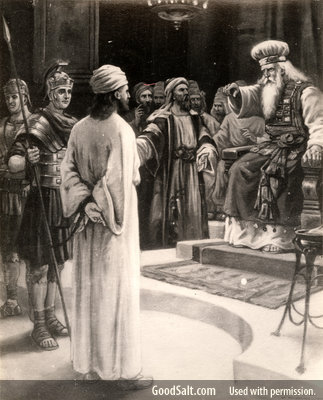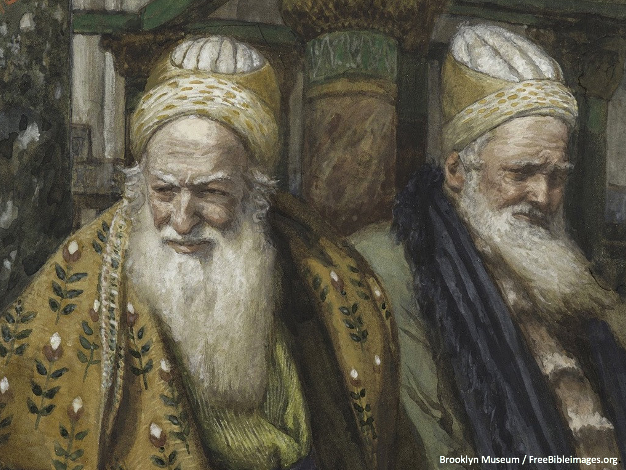“But may the God of all grace, who called you to His eternal glory by Christ Jesus, after you have suffered a while, perfect, establish, strengthen, and settle you.” I Peter 5:10
When we go through difficult times, we may feel as though our pain and disappointment will never end. We can be a lot like Job who initially blessed God when he lost his livestock, servants, and children (Job 1:13-22). But as his physical sufferings intensified, he became bitter toward God (Job 10:1-3 7; 19:6; 23:3-7). He moved from blessing to bitterness. Instead of walking through his pain with God’s help, his pain was walking all over him. This is the toll that physical suffering can take in our lives. When the end of our pain and suffering seems out of reach, we can easily lose perspective and be overtaken by despair and depression.
The aging apostle Peter understood this when he wrote to Christians who were facing severe persecution and trials in the first century under the Roman Emperor Nero. Peter had denied knowing Jesus in the face of persecution early in his Christian life (John 18:15-18, 25-27). But by the time he wrote this epistle he had come to understand that suffering precedes glory. The cross comes before a crown. Thorns come before a throne. Peter wants his readers to have a broader perspective regarding their sufferings.
In the final chapter of his epistle, Peter instructs his readers to submit to one another and to God (5:1-7). He advises them to stand firm against the devil by recognizing his tactics (5:8), resisting him in faith (5:9a), and realizing their struggles are not unique (5:9b). He reminds them that there were believers all around the world facing difficulties because of their faith in Jesus.
Peter encourages his readers to look to the God of all grace to sustain them through these turbulent times when he writes, “But may the God of all grace, who called you to His eternal glory by Christ Jesus, after you have suffered a while, perfect, establish, strengthen, and settle you.” (I Peter 5:10). Notice the word “after.” Peter doesn’t say “If you have suffered…” He says, “after you have suffered.” The apostle wants us to know that suffering is inevitable, unavoidable, and inescapable in the Christian life. Christ warned His followers of persecution when He informed them that the world would hate them just as it hated Him (John 15:18-21).
Suffering not only includes persecution and martyrdom, but anything that causes pain or distress such as an illness, a financial loss, a personality conflict, unjust criticism, mental or emotional frailty, life’s failures, unhealthy family relationships, and the process of aging, etc. 1
Peter also wants us to understand that in comparison to eternity, our sufferings on earth will last only a little “while.” Knowing that our difficulties and disappointments are temporary can give us hope that something better awaits us in the future.
It is significant that Peter describes God as “the God of all grace” here.He does not say God is the God of “some” grace or “a little” grace. He says, God is “the God of all grace.” Grace (charitos) is God’s undeserved or unmerited favor and kindness. When we are suffering, God’s grace may seem partial or limited to us. But Peter reminds us that God’s grace is sufficient for “all” that we face in this broken world. Our difficulties and disappointments will never exceed His grace. His supply of grace will always be enough for any situation we may face (2 Cor. 12:9).
Our gracious God has “called you to His eternal glory by Christ Jesus.” This is not a reference to salvation from hell or the justification of all believers. This is a reference to the imperishable inheritance or “eternal glory” that is earned through suffering (1:4-11; 3:9; 4:11-14; 5:1, 4; cf. Rom. 8:17). Peter is writing to Christians (1:2, 23; 2:7) who are facing persecution (1:4). Their faith would pass the test only if they persevered in their faithfulness to Christ (1:6-7a). In that case they would gain “praise, honor, and glory at the revelation of Jesus Christ” (1:7b).2
While all “praise, honor, and glory” come from the Lord Jesus Christ, “this in no way suggests He will not share these with others. Indeed, He promised to share these blessings with believers who persevere (compare Matthew 16:27; 2 Timothy 2:12; Hebrews 1:9; 1 Peter 4:13; Revelation 2:26; 3:21). Allowing humans to have some measure of glory, honor, and power in no way diminishes Christ’s glory. If it did, Moses’ face would never have shone. Elijah wouldn’t have been taken up to heaven in a whirlwind and flaming chariot. David would never have been king of Israel. The Lord Jesus would not be called the Son of David. He would not have promised the apostles that they would rule over the twelve tribes of Israel. He wouldn’t have given Adam and Eve and all of mankind dominion over the earth. And so on.” 3
“Suffering poses what has probably been in all ages the most serious problem for believers. Suffering is not only the last thing to be considered useful but rather something to be avoided, evaded, and shunned. But according to the Word of God, suffering is not an accident but a gift to be cherished, for when properly received, it works to enhance one’s eternal rank, fame, and honor.” 4
Just as Christ’s glorification and rule were preceded by suffering (I Peter 3:9; 5:11; cf. Phil. 2:5-11; Heb. 1:1-4; 2:6-10), so a believer’s participation in Christ’s future glory and reign must be preceded by suffering (I Peter 1:4-11; 4:11-16; cf. Rom. 8:17-18; Phil. 1:29; 2 Tim. 2:12; Rev. 2:25-27; 3:21). Christians who faithfully resist the devil will receive this inheritance salvation. If we rely upon God’s grace to help us endure suffering for a little “while” now, then we can take part in Christ’s glorious reign forever.
After believers have suffered a little “while,” Peter prays for God to “perfect” (katartizō) them. This word means to “mend what is broken, to set right what has gone wrong, to complete and restore.” 5 He is speaking here of being brought to maturity or completion, not sinless perfection. 6 The word translated “establish” (stērizō) means “to make stable and support” 7 so we can endure persecution and suffering. Christ gives us stability in an unstable world. Peter also prays God will “strengthen” (sthenoō) or make us strong 8 so we have courage no matter what we face. Instead of giving up when we are in distress, God will empower us to give in to Him to supply what we lack. “Settle” (themelioō) refers to building on a rock, setting upon a secure foundation, 9 and therefore being immovable. Peter is praying God will keep them standing on solid footing so they will not be drawn away from their faith by Satan’s schemes. 10
The apostle understands the benefits of suffering. He does not pray for his readers to escape their trials, but to grow and mature through them. Suffering perfects, establishes, strengthens, and settles the believer who endures. Such benefits prepare the believer to rule with Christ.
To reign with Christ…
- A believer must be mature (“perfect”). Through suffering God has developed Christlike character in his life (cf. Rom. 5:3-5; James 1:2-4). Instead of thinking only of oneself, he or she has learned to serve Christ by serving others. Enduring hardships has given him more compassion toward those who face similar difficulties. We have all seen what happens when an immature Christian assumes a position of influence and leadership. It is disastrous. He serves himself instead of Christ. He causes more pain and less peace in the lives of those he attempts to lead.
- A believer must be stable (“establish”). He is dependable and consistent in his pursuit of Christ. Difficulties do not distract him from God’s purpose in his life. He remains focused on Christ no matter what challenges are before him.
- A believer must be strong (“strengthen”). He has the inner strength to encourage himself and others when tempted to give up under distressing circumstances. Instead of giving up, he gives in to Jesus to supply what he lacks.
- A believer must be settled (“settle”). The truth of God’s Word goes deep into his soul, so he is not easily drawn away from Christ by Satan’s tactics. His spiritual foundation is solid because it is rooted in the unchanging truth of God’s Word.
While suffering is unavoidable in this fallen world, God reminds us through the apostle Peter that it is temporary. All who believe in Jesus for eternal life will be in Christ’s eternal kingdom on the new earth, but only those who remain faithful to Christ will share in His glorious reign. This promise of “eternal glory” (reward) is meant to encourage us not to give up as we face hardships now.
“If a child of God could actually see into the future and fully visualize the exalted rank that the school of suffering is creating for him, it would be easier to” “glory in tribulation” (Rom. 5:4). 11
Wilkins writes, “Imagine if God guaranteed you $100 million here and now if you persevered in faith and good works for twenty years. I think the number desiring to serve the Lord would go up significantly. Well, what if God offered something better than that? A person who received $100 million at age forty would have only a few decades to enjoy it. What if God offered rewards that last forever, not just for a few decades? Wouldn’t that be far superior?
“Ruling with Christ forever is priceless. The hidden manna and the fruits from the tree of life will be wonderful blessings. Treasure that is currently being stored up for us in heaven is something we will enjoy forever.
“Many Christians place more hope on winning the lottery than they do on gaining meaningful eternal rewards. Either they are completely unaware of what God says, or they are convinced the rewards won’t be that special.
“Mary Decker Slaney is arguably the greatest female athlete the U.S. has ever produced, setting twenty-six U.S. and seventeen world records during her amazing career. In 1982 she was the top female runner in the world in all distances from 800 meters to 10,000 meters (one-half mile up to six miles). Due to an injury, she missed the 1976 Olympics. She missed the 1980 Olympics in Russia because of the U.S. boycott of the games. Favored to win the gold in both the 1,500 and 3,000 meters in the 1984 Los Angeles Olympics, Mary decided to compete only in the 3,000-meter race in order to reduce the risk of injury. In the finals of the 3,000 she was in the lead, running strong, and it appeared she would easily win the race. Then Zola Budd, a barefoot runner from South Africa, with little international experience, accidentally tripped Mary. Down to the track she went. As she was writhing in pain in the infield, the race went on without her.
“Mary competed in the 1988 and 1996 Olympics but failed to win any medals. During her career she underwent twenty leg, foot, and ankle operations in order to keep her running career alive. Imagine all the pain of the surgeries and recoveries. And anyone who has run track knows that the workouts are very painful, even for a healthy runner.
“Mary had a drive within her that was intense. Her motivations were likely numerous: a love for running competitively, a desire for fame and fortune, the lure of the medals and the cheering crowds, and traveling around the world. For over twenty years she experienced these things.
“The apostles were that intense in their service for Christ. And so should we all be. Our motivations are numerous as well: present blessings, avoiding God’s discipline, gratitude, joy of service, a desire to please and glorify God, as well as a desire to gain eternal rewards.” 12
God wants us to understand that no matter how hard, horrible, or heart-breaking life may be now, we can cling to this future reality consisting of eternal rewards. They are the ultimate in delayed gratification. God guarantees it. 13
Prayer: Precious heavenly Father, thank You for the amazing grace You have given to us through Jesus Christ. By grace, You freely saved us from eternal suffering in the lake of fire when we believed in Jesus. And now Your grace can sustain us through pain and suffering on earth so we may partake in the glorious eternal rule of Your Son, Jesus Christ. Just as suffering preceded Christ’s exaltation to the right hand of Your throne, so too we must also endure suffering to rule with Christ in eternity. Please help us respond to suffering properly so we may become more like Jesus. Thank You for using the difficulties and disappointments in our lives to prepare us to reign with Your Son. To Him be all the glory both now and forever. In Jesus’ mighty name we pray. Amen.
ENDNOTES:
1. Paul E. Billheimer, Don’t Waste Your Sorrows (CLC Publications, 2012 Kindle Edition), Kindle Locations 226 to 231, 729 to 734, 1378 to 1383, 1516 to 1872.
2. Robert N. Wilkin, The Road to Reward: A Biblical Theology of Eternal Rewards Second Edition (Corinth, TX: Grace Evangelical Society, 2014 Kindle Edition), pg. 85; Joseph Dillow, Final Destiny: The Future Reign of The Servant Kings: Fourth Revised Edition (Grace Theology Press, 2018 Kindle Edition), pp. 73-74, 212-220.
3. Wilkin, The Road to Reward, pg. 151.
4. Billheimer, Don’t Waste Your Sorrows, Kindle Location 268.
5. Walter Bauer, A Greek-English Lexicon of the New Testament and Other Early Christian Literature: Third Edition (BDAG) revised and edited by Frederick William Danker (Chicago: University of Chicago Press, 2000 Kindle Edition), pg. 526.
6. Gary Derickson; Robert Wilkin; J. Bond; Brad Doskocil; Dwight Hunt; Shawn Leach; The Grace New Testament Commentary: Revised Edition (Grace Evangelical Society, Kindle Edition, 2019), pg. 576.
7. Bauer, A Greek-English Lexicon, pg. 945.
8. Ibid., pg. 922.
9. Ibid., pg. 449.
10. Derickson, The Grace New Testament Commentary, pg. 575.
11. Billheimer, Don’t Waste Your Sorrows, Kindle Location 1441.
12. Wilkin, The Road to Reward, pp. 85-86.
13. Ibid., pg. 86.



